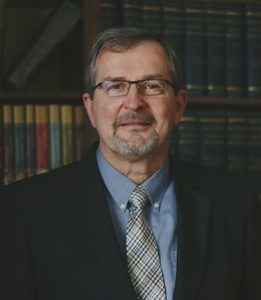
Wilhelmus à Brakel and The Christian’s Reasonable Service
Wilhelmus à Brakel is among the most venerated of the theologians representing the Dutch Further Reformation (Nadere Reformatie), a period similar to and coinciding with English Puritanism. This veneration is largely due to the profound and abiding influence of his magnum opus De Redelijke Godsdienst, available in English as The Christian’s Reasonable Service.
The importance of this work was recognized soon after its publication in 1700. Even though à Brakel had great difficulty finding a publisher for the initial edition (finally finding a Roman Catholic publisher!) his work was in demand within a very short time. New and improved editions soon followed, twenty in the eighteenth century alone.
One of à Brakel’s contemporaries, Abraham Hellenbroek, spoke of his friend as being a man of tender and intimate piety.[1] Hellenbroek recognized the importance of The Christian’s Reasonable Service when he stated in almost prophetical terms that this work was so valuable that it would transcend the passage of time.[2] History has vindicated that prediction, for à Brakel’s work continues to be acknowledged as one of the true classics of the Dutch Further Reformation.
Systematic Theology for Church Members
Why has this work been, and continues to be, so influential? What is The Christian’s Reasonable Service unique contribution to the rich heritage of post-Reformation orthodoxy? Why do pastors throughout the English-speaking world respond so favorably to this work, deeming it to be a most helpful resource for their pastoral ministries?
The uniqueness of à Brakel’s work lies in the fact that it is more than a systematic theology. His selection of the title is already an indication that it was not merely his intention to present a systematic explanation of Christian dogma to the public. In selecting the words of Romans 12:1 as the basis for his title, à Brakel not only wished to indicate that it is an entirely reasonable matter for man to serve His Creator who has so graciously revealed Himself in His Son Jesus Christ by means of His Word, but he primarily wished to convey that God demands from man that he serve Him in spirit and in truth, doing so in an intelligent, reasonable, and godly manner.[3]
This brings us at once to the heart of the matter. À Brakel wrote this work for church members—not for theologians, though it was his wish that they benefit from it as well. This explains why this work is permeated with practical application of the doctrines he so thoroughly explains. À Brakel’s intent in writing is inescapable: He intensely wished that the truths expounded would become an experiential reality in the hearts of his readers. In a masterful way, he establishes the vital relationship between objective truth and the subjective experience of that truth.
Thus, he first establishes a solid biblical foundation for each doctrine with which he deals, by quoting profusely from the Scriptures. You will find his selection of quotes to be an impressive feature, proving he had a profound grasp of the Scriptures and their comprehensive context. This scripturalness is rationally reinforced by his frequent resorting to the scholastic method to validate his positions.
The Nature of True Holiness
Furthermore, as a man taught of God, he then ably defines and describes Christian experience in terms of the Scriptural truths he has expounded. The undeniably mystical flavor of this work represents biblical mysticism at its best—a Spirit-wrought mysticism that fully harmonizes with the Spirit-inspired Scriptures. This explains at once why Jesus Christ truly has the preeminence in this work. It is the Logos, Jesus Christ, who is the marrow of God’s Word and every doctrine contained in it. À Brakel therefore consistently teaches that in the subjective experience of this Word, Jesus Christ also has the preeminence. His work brims with references to Him whom the Father has given a name above every name. For à Brakel the name of Jesus is sweeter than honey. One can almost sense the inner stirrings of His soul when He exalts Jesus as the Father’s unspeakable gift to fallen sons and daughters of Adam, and as the Lord and Savior of His redeemed people.
These rich experiential applications found at the conclusion of each doctrinal chapter in the first two volumes make this work invaluable and pastoral. Though a theologian par excellence, à Brakel was first and foremost a pastor who made his astute theological acumen entirely subservient to the glory of God and the spiritual welfare of His church. Click To Tweet In writing this work, à Brakel practiced what he advised all ministers to do. In chapter 28 he writes: “He [the minister] ought to use all his scholarship to formulate the matters to be presented, in order that he might express them in the clearest and most powerful manner. While using his scholarship, however, he must conceal his scholarship in the pulpit.”
In reading this work, one will be struck by its kinship with English Puritan literature. This is particularly evident in the third and fourth volumes which are devoted almost entirely to the life of sanctification. As is true for the Puritans, à Brakel was an able physician of souls, proving himself to be a divine intimately acquainted with spiritual life and all its vicissitudes. Like the Puritans, he elucidates the teaching of Scripture that godliness is a scriptural vindication that we have experienced the truth in our souls. Inward experience manifests itself outwardly in true piety. À Brakel does not leave us in the dark as to what he understands the Christian life to be. We believe it will be difficult to find a work in English devotional literature which spells out the nature of true holiness as specifically and meticulously as à Brakel does.
Reformation Heritage
The obvious similarity between à Brakel’s writings—among the best of Dutch Further Reformation literature—and Puritan literature is highly significant. It proves that the Puritans and the Dutch Further Reformation divines (sometimes referred to as the Dutch Puritans) were essentially cut from the same cloth. It will be difficult to find essential differences in the articulation of Christian experience between à Brakel and such English Puritans as John Owen, Thomas Goodwin, and John Bunyan.
Hopefully, à Brakel’s four volume work will continue to contribute to the growing merger of the rich heritages of the two premier experiential movements of the post-Reformation period: English Puritanism and the Dutch Further Reformation. The growing recognition of the kinship of these two movements have recently prompted scholars to refer to them as “North Sea Piety.”
Pastors in the Netherlands have enjoyed already for centuries the privilege of enriching their own ministries by mining the riches of Scripture from The Christian’s Reasonable Service, and have witnessed divine approbation upon these writings. Many in the English speaking world are now enjoying the same privilege!
May the vital Christianity à Brakel promotes throughout this work again flourish and adorn the church of Jesus Christ, and may many more pastors find The Christian’s Reasonable Service to be a resource that will nourish their own soul, and will better equip them to shepherd the sheep entrusted to their care. This ultimately was à Brakel’s overarching objective in writing this work, and thus he concludes his preface by writing, “May the almighty and good God, who repeatedly encouraged me when I had intentions of discontinuing this task and who is the Author of whatever good is to be found in this work, pour out His Holy Spirit upon all who will either read or hear this book read.”
[1] J. van Genderen, De Nadere Reformatie: Beschrijving van haar voornaamste vertegenwoordigers (’s Gravenhage: Boekencentrum, 1986), 165.
[2] Ibid., 166.
[3] Ibid., 170–71.


